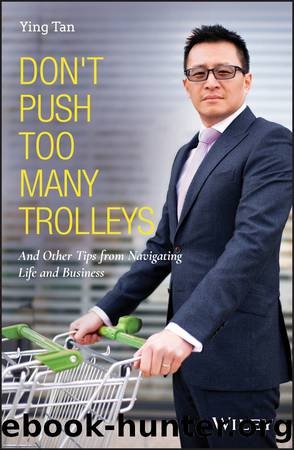Don't Push Too Many Trolleys: And Other Tips from Navigating Life and Business by Tan Ying;

Author:Tan, Ying; [Tan, Ying]
Language: eng
Format: epub
Publisher: John Wiley & Sons, Incorporated
Published: 2020-12-02T00:00:00+00:00
Five Out of Eight Ain't Bad
I know myself well enough, now, to set the right goals for me â goals that suit my skills, my stage in life and business, and that I can comfortably achieve without completely burning myself out. I have done one of my spidergrams every year for a long time now and I would say, on average, I achieve five or six of my eight goals, which is a pretty decent rate. Anything above five is good for me. If you are achieving all eight with ease, you are probably setting goals that aren't hard enough (you'll remember I almost achieved all eight in 2018, so I might need to get tougher on myself soon!) If you are only achieving two or three, you are being too ambitious, you are not setting goals achievable for you.
Having said all that, no matter how careful you are, no one can get all their goals spot on, all the time. I do carry forward my goals sometimes, when I haven't achieved them in the year I set them. I had the goal to buy a âmidlife-crisis carâ on my list for three years before I finally got it. I had never had a fancy car; I'd always bought practical cars. I rarely treat myself; I'm not that extravagant. For example, I don't generally travel in first class. But I finally felt, as I hit 40, that I needed to do something flashy for me. So I finally got a BMWi8 last year.
I think it's important to make some of your goals fun, frivolous ones. Because it's not just about the car or whatever material object you set as your goal to own; it's about the achievement, about the fact that you can do it.
I always buy my cars outright; I think financing is âcheatingâ and it also creates âbad debt.â I only have mortgage debt, what we consider âgood debtâ, and only on my investment properties where I am making a positive return on my investment. If I took debt on furniture, or computers or cars, it would be bad debt because those things depreciate fast. âGood debtâ is when you have debt on something that is working for you. If you are borrowing money at 2% on a property, but you are getting a rental yield of 5â6%, then this is good debt. (You are also making money, as your capital investment in the property goes up with the long-term rising property market.) If you buy a car and you are borrowing at 4% interest rate, you lose money because you will end up paying more for that car than it was ever worth (while its resale value goes down).
When you are goal setting, avoid anything that you can't control yourself. You can't pursue things that are governed by external factors or other people's decisions, like âwin an award.â But that doesn't rule out things that you aren't in control of but you can work towards achieving. For
Download
This site does not store any files on its server. We only index and link to content provided by other sites. Please contact the content providers to delete copyright contents if any and email us, we'll remove relevant links or contents immediately.
Hit Refresh by Satya Nadella(9125)
When Breath Becomes Air by Paul Kalanithi(8426)
The Girl Without a Voice by Casey Watson(7885)
A Court of Wings and Ruin by Sarah J. Maas(7819)
Do No Harm Stories of Life, Death and Brain Surgery by Henry Marsh(6934)
Shoe Dog by Phil Knight(5257)
The Rules Do Not Apply by Ariel Levy(4957)
A Higher Loyalty: Truth, Lies, and Leadership by James Comey(4954)
Hunger by Roxane Gay(4922)
Tuesdays with Morrie by Mitch Albom(4769)
Everything Happens for a Reason by Kate Bowler(4733)
The Immortal Life of Henrietta Lacks by Rebecca Skloot(4576)
Millionaire: The Philanderer, Gambler, and Duelist Who Invented Modern Finance by Janet Gleeson(4465)
How to Change Your Mind by Michael Pollan(4355)
All Creatures Great and Small by James Herriot(4311)
The Money Culture by Michael Lewis(4198)
Man and His Symbols by Carl Gustav Jung(4128)
Elon Musk by Ashlee Vance(4121)
Tokyo Vice: An American Reporter on the Police Beat in Japan by Jake Adelstein(3982)
